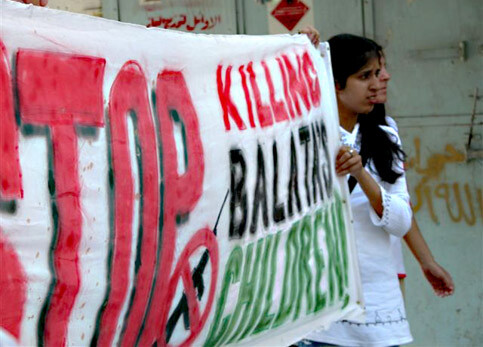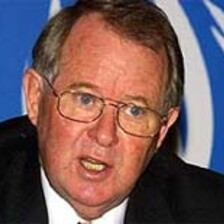The Electronic Intifada 22 August 2005

Palestinian women in the West Bank and Gaza Strip have lived all or most of their lives under Israeli occupation. (Markus Cuel)
The government of Israel once again expressed its disregard for international law and the United Nations system during the 33rd Session1 of the Committee on the Elimination of Discrimination against Women (CEDAW), which oversees the implementation of the UN Convention on Women.
Like most human rights institutions at the UN, the CEDAW tends to produce its reports using legalistic and diplomatic language. However, it would be a mistake to disregard them because their language is not stronger. Despite appearances, Israel is in fact very sensitive to any criticism from the United Nations and international community.
This article seeks to identify some areas where the CEDAW insisted Israel acknowledge its responsibilities towards Palestinians, both inside Israel and in Occupied Palestinian Territory.2
Grave concern for unequal treatment
The CEDAW “expressed grave concern about implementation of the Convention (on Women) in the Occupied Palestinian Territories, questioning whether real equality existed between Jewish and non-Jewish women in Israel.”
The CEDAW furthermore “lamented conditions in the West Bank and Gaza Strip, where Palestinian women - for security concerns - were treated like second-class citizens, often losing their houses and living without water or electricity”.
Much evidence was given in support of this. For example, the Committee noted that only 5 out of 254 of Israel’s judges and less than 2% of its civil servants were Palestinian. Responding to Israel’s blanket arguments that this was due to “security concerns”, the CEDAW asked: “Would the Palestinian female judges blow up the courts?”
The CEDAW also drew attention to unequal treatment of Israelis and Palestinians in accessing health care (drawing particular attention to pregnant women who were stopped at checkpoints on their way to hospitals). The CEDAW furthermore drew attention to Palestinians’ unequal access to education and unequal access to employment.
“Only applies to Israel”
Shavit Matias, Deputy Attorney General in the Israeli Ministry of Justice, presented Israel’s country report3, conveniently insisting (as only a lawyer can) that “jurisdiction of the Convention extended only to Israel”. In its earlier responses to the CEDAW’s questions, the Israeli government had provided a totally different response that: “a normal peacetime human rights regime, of which the CEDAW is clearly a central component, cannot be considered applicable with regard to the territories” (emphasis added).
Emphasising Israel’s bizarrely contradictory position, Matias further insisted that, in fact, it was the Palestinian Authority which had jurisdiction over such matters and that “Israel had no control over what they did”.
In this very confused way, Israel emphasised its now common refrain, entirely avoiding discussion of its responsibilities against Palestinians, both in Israel and in Occupied Palestinian Territory.
Condemnation of Israel’s abuses
The CEDAW is made up of independent experts from many countries around the world. In their questions and responses to Israel, and in the CEDAW’s important concluding comments, the CEDAW overwhelmingly condemned Israel’s abuses against Palestinians (and Bedouins), both inside Israel and Occupied Palestinian Territory.
In its concluding comments,4 which are always worded in diplomatic language, the CEDAW made clear that Israel’s position that it is not responsible for what takes place in the Occupied Territories was “contrary to the views” of CEDAW as well as other international bodies.5
In other words, Israel’s position is in total contradiction to international law.
CEDAW noted that, in fact, Israel did have “obligations under international human rights conventions as well as humanitarian law” concerning not only Israel, but also the Occupied Territories. As such, CEDAW insisted that Israel report on the conditions of women not only in Israel, but also in the Occupied Territories.
Treated with “second class status”
At times, CEDAW experts expressed only thinly disguised frustration at Israel’s arrogant refusal to accept its responsibilities towards Palestinian women. One expert lamented that: “demolitions, movement restrictions were all part of the occupation that had affected the lives of more than two generations of Palestinian women.”
Another expert responded that “it was obvious that Palestinian women had a second-class status compared with Jewish women in Israel”.
CEDAW’s important concluding comments, while diplomatically worded, reaffirmed these frustrations. CEDAW expressed unprecedented “concern” at a variety of measures undertaken by Israel. These included: unequal access to decision-making structures (including courts); unequal access to education, employment and healthcare and incidents at checkpoints.
Support for the International Court of Justice
Finally, CEDAW made explicit reference to the International Court of Justice (ICJ) in its concluding comments. This was a crucial re-affirmation of the ICJ’s conclusions in its July 2004 Advisory Opinion on Israel’s construction of a Wall in Occupied Palestinian Territory.
To recall, the ICJ’s Advisory Opinion, reported in numerous other articles on the Electronic Intifada6, was a ground-breaking development, re-affirming the application of international law, refuting Israel’s arguments that international law treaties didn’t apply in the Occupied Territories and citing numerous violations of international law by Israel and its “associated regime”, including the construction of settlements and actions of the Israeli military.
“No time for appeasement”
CEDAW has joined a chorus of voices insisting that Israel’s violations of international law cannot be tolerated. The obligations of States, the United Nations and the European Union to take action in response to these violations are now even more urgent than ever. Re-iterating the words of the United Nations independent Special Rapporteur on the Occupied Territories, Professor John Dugard:
“Israel’s defiance of international law poses a threat not only to the international legal order but to the international order itself. This is no time for appeasement on the part of the international community.”7
Use the reports of the United Nations
Many human rights advocates who follow the work of the United Nations and its treatment of Palestine have become frustrated at its lack of strong statements and feel that things are not progressing quickly enough. Such frustrations are understandable and the United Nations, European Union and individual States should indeed be urged to do much more than they are.
All should be reminded that this issue affects them all: as Dugard puts it, this issue threatens the international order.
This said, it is also important for human rights advocates to see every development as part of a cumulative (step-by-step) process.
The Advisory Opinion of the International Court of Justice concerning Israel’s construction of a Wall (and associated regime) drew upon decades of decisions by the United Nations General Assembly, Security Council and human rights institutions in declaring Israel to be violating countless international laws.
Similarly, CEDAW draws upon many years of (unsuccessfully) seeking to hold Israel to account.
From an international law point of view, CEDAW was unrelenting in its criticisms of Israel. Human rights advocates are urged to use the conclusions of CEDAW, the ICJ and other UN institutions to strengthen their arguments that Israel be held responsible for its violations against Palestinians.
Jeff Handmaker is an independent legal advisor in The Hague as well as a part-time Ph.D. researcher at the Netherlands Institute of Human Rights (SIM) in the law faculty at Utrecht University.
Endnotes
Related Links




